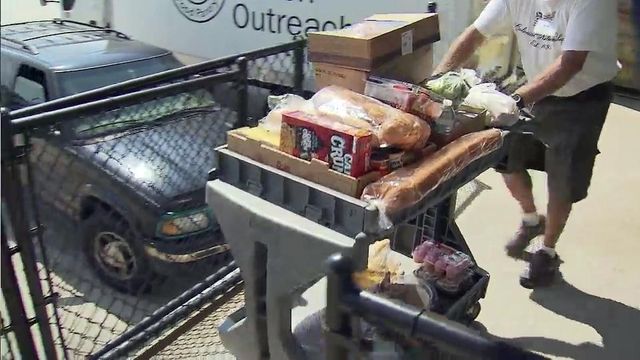NC food banks devoured by demand after state, federal cuts
Cuts to unemployment benefits in North Carolina and continued problems with the state computer system that processes food stamp benefits have created a domino effect that has started toppling food banks across the state.
Posted — UpdatedA growing number of North Carolina residents have turned to food banks in recent months to stave off hunger, especially after about 65,000 families lost their long-term jobless benefits at the beginning of July as part of an overhaul of the state's unemployment assistance system.
The Inter-Faith Food Shuttle, for example, served about 6,000 people between January and March at its mobile markets, where it distributes produce and other fresh foods at area churches or in parking lots. Between April and June, the number of people at the mobile markets rose to 8,700, and officials said the number has hit 9,200 since July and is expected to continue rising.
"What we're seeing is food banks are being asked to be the safety net of the safety net," said Alan Briggs, executive director of the North Carolina Association of Food Banks.
In some cases, Briggs said, local social services offices have sent people to food banks because the troubled conversion to the NC FAST computer system has left low-income families without food stamps for months at a time.
Jermel Thomas headed to Catholic Parish Outreach in Raleigh after his food stamps were delayed to get a week's worth of groceries.
"Every month, it's a new struggle, a new juggling act," said Thomas, who works two part-time jobs and has three children to feed. "I've been in situations where I had to decide whether to pay my light bill or eat."
Catholic Parish Outreach normally serves about 10,000 people a month, officials said. In July and August, the number topped 12,250 each month.
In addition to the state cuts, Briggs said, the federal government reduced the amount of farm surplus commodities given to North Carolina food banks last year by 25 to 33 percent. Also, federal budget cuts have trimmed food stamp benefits by about $400 a year for a family of four, and further cuts are expected after Congress separated the benefit from the annual farm bill.
Some food banks and pantries across the state are cutting back their hours because they're running short of food, Briggs said.
"We have had some stories that that's happening," he said.
The Inter-Faith Food Shuttle has a steady supply of donated food from farmers, grocery stores and restaurants, said Kia Baker, division chief of food recovery and distribution.
"We have never run out of food, but we have to be careful about the amounts of food we give to every person we see," Baker said.
The organization typically distributes food to pantries, such as Catholic Parish Outreach, but Baker said her staff has been assembling about 15 emergency boxes of food a week recently to help desperate families.
"We don't have the emotional capacity to turn people away when they are really hungry and have children at home who need to eat," she said.
While donations of food are appreciated, food banks said they need more financial support, which they can extend further because of their bulk-buying power.
The Food Bank of Central and Eastern North Carolina, which serves 34 counties, including the Triangle, will hold an online appeal for help Friday. The organization will livestream its second annual 24-Hour Online Telethon, starting at noon, from its warehouse in north Raleigh.
Last year's telethon raised more than $20,000. This year's goal is $50,000.
• Credits
Copyright 2024 by Capitol Broadcasting Company. All rights reserved. This material may not be published, broadcast, rewritten or redistributed.





